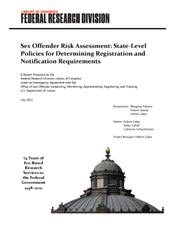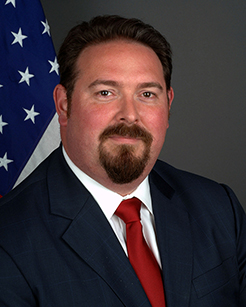Sex offender registration
SMART FY 2023 Fellowship Program: Sex Offender Registry Law Enforcement Liaison and Sexual Violence Prevention Fellowships
SMART FY 2023 Support for Adam Walsh Act Implementation Grant Program
SMART FY 2022 Maintenance and Operation of the Dru Sjodin National Sex Offender Public Website
SMART FY 2022 Support for Adam Walsh Act Implementation Grant Program
SMART FY 2021 Invitation to Apply — Maintenance and Operation of the Dru Sjodin National Sex Offender Public Website
The Utility of Sex Offender Registration for Stranger-Perpetrated Sex Crimes
Incidents involving a stranger perpetrator were closed significantly faster after a registry was implemented in the state.
The FBI-maintained National Sex Offender Registry is a multifaceted tool used by law enforcement to track and monitor persons who are convicted of sex crimes. What may be less recognized, and less often studied, is the ability of a sex offender registry to function as an investigatory database...
SMART remembers, mourns the loss of tribal SORNA officers to COVID
In June and September, tribal communities lost two SORNA officers who had been key to implementing the Sex Offender Registration and Notification Act (SORNA) on tribal lands. In June, Navajo Nation Police Officer Michael Lee was the first Navajo officer to die from COVID-19. In September, White Mountain Apache Tribal Police SORNA Compliance Specialist Elmer Lamson also died of COVID-19. As SORNA officers, Lee and Lamson played...
Research
Sex Offender Risk Assessment: State-Level Policies for Determining Registration and Notification Requirements
This report from the Federal Research Division at the Library of Congress presents an analysis of how states use risk assessments to determine aspects of offenders’ registration and notification requirements.
Sex Offender Registration and Notification Act—Summary and Assessment of Research
This report from the Federal Research Division at the Library of...
Recognizing a Decade of Progress at SMART
For the past 10 years, the Office of Sex Offender Sentencing, Monitoring, Apprehending, Registering, and Tracking (SMART) has been at the forefront of implementing effective practices to register and manage sex offenders.
This summer, we'll be recognizing the 10th anniversary of the Adam Walsh Child Protection and Safety Act of 2006. This legislation, named after the 6-year-old boy whose senseless murder led to increased public...
How Tribes can "TAP" into Information Databases
Ten tribes are participating in a new phase of the roll-out of the Tribal Access Program, a valuable tool available from the Department of Justice that improves public safety as it allows tribes to access and exchange criminal justice information. Launches have already occurred at Fort Peck, Makah and Standing Rock, and others are scheduled throughout the summer. The Attorney General recently highlighted TAP as...
The National Sex Offender Public Website: Your Go-To Resource for Sex Offender Information
There are many things to think about when planning a move to a new area and a new home: are the schools good, what will the taxes be, what will the commute be like, are there sex offenders nearby? Similar to finding out what the amenities or pitfalls are when you consider a new home, it's also good to locate where sex offenders live, work...
SMART Forges Partnerships to Manage Sex Offenders
On July 27, 1981, 6-year-old Adam Walsh entered a Florida department store with his mother. He was abducted by a stranger, and his remains were found two weeks later. The tragedy of the young boy's murder—a brutal crime that was never brought to trial—shocked the nation. His devastated family and supporters channeled their grief and anger in a positive way―to protect other children from sexual...
Indian Country
Indian Tribes, Nations and Pueblos Implementing SORNA
Under the Adam Walsh Act, all federally recognized Indian tribes are entitled to elect whether to carry out the sex offender registration and notification requirements of the Act or delegate the functions to the state(s) in which the tribal land is located, unless the tribe is subject to the criminal jurisdiction of a state under 18 U.S.C. §...
How the Sex Offender Registry Tool Can Help You
The Sex Offender Registry Tool (SORT) is a sex offender management application provided to states and territories by the U.S. Department of Justice and the Office of Sex Offender Sentencing, Monitoring, Apprehending, Registering, and Tracking (SMART). SORT helps states and territories to implement the Sex Offender Registration and Notification Act registry system requirements. Available at no cost, SORT was designed to make the sex offender registry system setup and maintenance process as efficient and effective as possible.
See the YouTube Terms of Service and Google Privacy Policy
SORNA Substantial Implementation Update
The SMART Office has received and reviewed a tremendous amount of information and material from the States, territories, and the District of Columbia about their progress toward substantial implementation of the Sex Offender Registration and Notification Act (SORNA), 42 U.S.C. § 16925(a) (Title I of the Adam Walsh Child Protection and Safety Act of 2006). To date, the SMART Office has received and reviewed full...
SORNA: Tribal Election, Delegation to the State and Right of Access
Title I of the Adam Walsh Child Protection and Safety Act of 2006, the Sex Offender Registration and Notification Act (SORNA), created the first opportunity for federally recognized Indian tribes to be included in a nationwide sex offender registration and notification system. SORNA specifies, with some restrictions, that a federally recognized Indian tribe may, by resolution or other enactment of the tribal council or comparable...
SORNA: State and Tribal Information Sharing
Title I of the Adam Walsh Child Protection and Safety Act of 2006, the Sex Offender Registration and Notification Act (SORNA), requires that jurisdictions share information within their jurisdictions as well as with other registration jurisdictions (see 34 U.S.C. § 20913 (c) and 34 U.S.C. § 20923 (b) (3)). Because of the unique nature of criminal justice coordination between states and tribes, collaboration is encouraged...
SORNA: Fingerprints and Palm Prints
Title I of the Adam Walsh Child Protection and Safety Act of 2006, the Sex Offender Registration and Notification Act (SORNA), requires that jurisdictions include in their registries a set of fingerprints and palm prints from each sex offender (see 34 U.S.C. § 20914(b)(5)). The National Guidelines for Sex Offender Registration and Notification specify that jurisdictions must maintain fingerprints and palm prints in digital format...
Military Convictions Under SORNA
Title I of the Adam Walsh Child Protection and Safety Act of 2006, the Sex Offender Registration and Notification Act (SORNA), specifically includes certain Uniform Code of Military Justice (UCMJ) convictions in its definition of "sex offense."
Department of Defense Instruction 1325.07 contains the specific list of UCMJ convictions that require registration under SORNA.1 Jurisdictions must ensure that all of the UCMJ convictions listed...
SORNA: Text of Registration Offense
Title I of the Adam Walsh Child Protection and Safety Act of 2006, the Sex Offender Registration and Notification Act (SORNA), requires that each jurisdiction's registry include "[t]he text of the provision of law defining a criminal offense for which the sex offender is registered" (see 34 U.S.C. § 20914 (b)(2)). The National Guidelines on Sex Offender Registration and Notification have since clarified this requirement...







